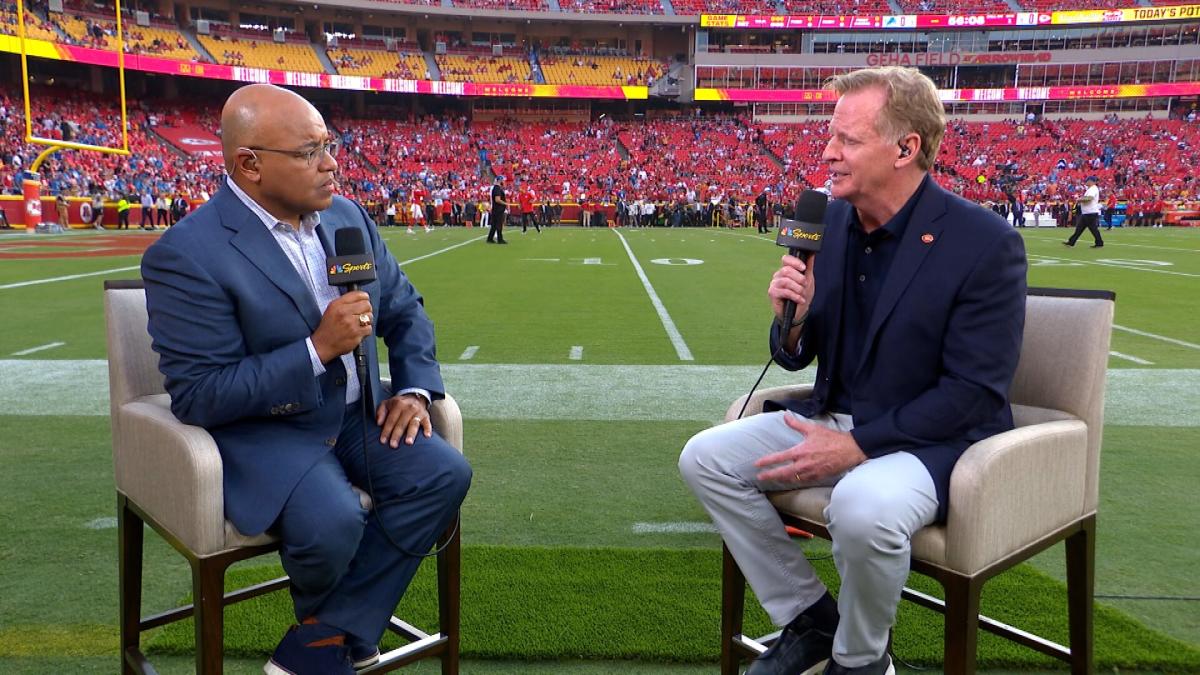
The NFL has a complicated relationship with gambling. For years, the NFL opposed the expansion of legalized sports wagering. Then, the moment the floodgates of gambling money opened, the NFL started grabbing for every dollar it could see.
It has created claims of inconsistency and hypocrisy, given the NFL’s very strict rules regarding any form of sports betting by non-players and goofy, nonsensical rules regarding sports betting by players.
During a Thursday night interview before the Lions-Chiefs kickoff game, Mike Tirico of NBC Sports asked Commissioner Roger Goodell about the NFL and gambling.
“Are you comfortable with how the league is reconciling gambling as a business entity for some of the league right now, and players —10 of whom were suspended this year for gambling?” Tirico said. “Are you comfortable with where it sits right now in trying to protect the integrity of the game?
“Well, Mike, it’s one of the reasons we oppose legalized sports betting, because of the risk to the integrity of the game,” Goodell said. “And so that’s always going to be our number one priority. When the Supreme Court overruled that, we have to be in that space. And it’s actually helped us with trying to educate our fans, educate our personnel. This isn’t just about players. It affects every league employee, every club employee. And so it’s pretty simple. If you bet on the NFL and you’re a part of the NFL, you’ve got a problem.”
It’s the NFL that has the problem, if it thinks the strategy for dealing with sports betting is simply to tell non-players to bet on no sports at all (violators have been fired) and players to not bet on NFL events and to only bet on non-NFL events when not at work. The potential pitfalls sweep far more broadly than the lowest of the low-hanging fruit.
The game oozes with inside information. How is it being protected? Is anyone even trying to do so?
And what about the periodic suspicions that players or officials are deliberately trying to blow games? Consider this 2012 quote from Goodell: “If gambling is permitted freely on sporting events, normal incidents of the game such as bad snaps, dropped passes, turnovers, penalties, and play calling inevitably will fuel speculation, distrust and accusations of point-shaving or game-fixing.”
Indeed they will. Social media was buzzing last night with tinfoil-hat suggestions that Chiefs receiver Kadarius Toney, who dropped four passes and gift-wrapped a pick-six for the Lions, had money on Detroit. Goodell at one point during his tenure as Commissioner specifically opposed the legalization of sports betting by pointing out that this is EXACTLY what will happen.
“Normal incidents of the game such as . . . dropped passes . . inevitably will fuel speculation, distrust and accusations of point-shaving or game-fixing.”
There’s also a flaw in Goodell’s logic regarding the justification for the NFL’s position on sports betting. “When the Supreme Court overruled that, we have to be in that space,” Goodell said.
But they don’t have to be in that space. They don’t have to have umpteen exclusive sports-betting partners. They don’t have to have sports books in stadiums. They don’t have to view legalized gambling as a way to grab more and more cash.
It would be MUCH easier for the NFL to send a clear and understandable message to all employees, players and non-players alike, if the NFL decided to continue to avoid all things gambling — like it did when sports betting was legal only in Nevada.
Now, there’s a team in Las Vegas. The next Super Bowl will be in Las Vegas. The league decided that, if the sports books are going to make money from sports betting, the league might as well wet its beak, too (or, as the case may be, jam its entire head into the bowl). Still, the NFL’s full embrace of sports betting increases the very risks Goodell used to cite in opposing it.
As I recently explained to A.J. Perez of FrontOfficeSports.com, Goodell’s past opposition to sports betting was so strong that I thought he’d have to resign when: (1) sports betting was legalized; and (2) the NFL decided to treat it as a revenue stream. He hasn’t, and he surely won’t.
Now, with the final years of his tenure beginning to unfold, the simple truth is that any and all potential problems arising from this new dynamic will be the problem of Goodell’s successor.